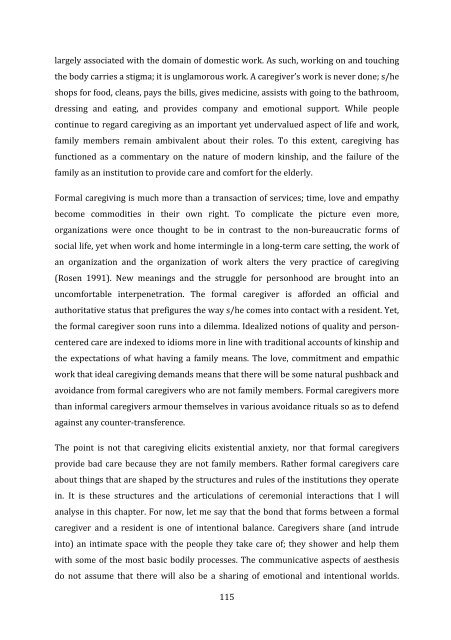Philip Y. Kao PhD thesis - Research@StAndrews:FullText
Philip Y. Kao PhD thesis - Research@StAndrews:FullText
Philip Y. Kao PhD thesis - Research@StAndrews:FullText
You also want an ePaper? Increase the reach of your titles
YUMPU automatically turns print PDFs into web optimized ePapers that Google loves.
largely associated with the domain of domestic work. As such, working on and touching<br />
the body carries a stigma; it is unglamorous work. A caregiver’s work is never done; s/he<br />
shops for food, cleans, pays the bills, gives medicine, assists with going to the bathroom,<br />
dressing and eating, and provides company and emotional support. While people<br />
continue to regard caregiving as an important yet undervalued aspect of life and work,<br />
family members remain ambivalent about their roles. To this extent, caregiving has<br />
functioned as a commentary on the nature of modern kinship, and the failure of the<br />
family as an institution to provide care and comfort for the elderly.<br />
Formal caregiving is much more than a transaction of services; time, love and empathy<br />
become commodities in their own right. To complicate the picture even more,<br />
organizations were once thought to be in contrast to the non-bureaucratic forms of<br />
social life, yet when work and home intermingle in a long-term care setting, the work of<br />
an organization and the organization of work alters the very practice of caregiving<br />
(Rosen 1991). New meanings and the struggle for personhood are brought into an<br />
uncomfortable interpenetration. The formal caregiver is afforded an official and<br />
authoritative status that prefigures the way s/he comes into contact with a resident. Yet,<br />
the formal caregiver soon runs into a dilemma. Idealized notions of quality and personcentered<br />
care are indexed to idioms more in line with traditional accounts of kinship and<br />
the expectations of what having a family means. The love, commitment and empathic<br />
work that ideal caregiving demands means that there will be some natural pushback and<br />
avoidance from formal caregivers who are not family members. Formal caregivers more<br />
than informal caregivers armour themselves in various avoidance rituals so as to defend<br />
against any counter-transference.<br />
The point is not that caregiving elicits existential anxiety, nor that formal caregivers<br />
provide bad care because they are not family members. Rather formal caregivers care<br />
about things that are shaped by the structures and rules of the institutions they operate<br />
in. It is these structures and the articulations of ceremonial interactions that I will<br />
analyse in this chapter. For now, let me say that the bond that forms between a formal<br />
caregiver and a resident is one of intentional balance. Caregivers share (and intrude<br />
into) an intimate space with the people they take care of; they shower and help them<br />
with some of the most basic bodily processes. The communicative aspects of aes<strong>thesis</strong><br />
do not assume that there will also be a sharing of emotional and intentional worlds.<br />
115
















